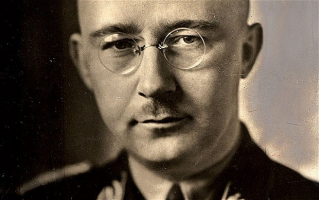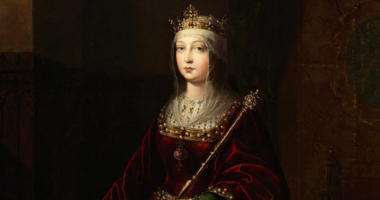Top 7 Interesting Facts about Jimmy Carter
Jimmy Carter, the 39th President of the United States and one of the most renowned humanitarians to hold the position, served as a bridge between the ... read more...frequently derided Gerald Ford and the drug-busting Ronald Reagan. Even though a nearly 100-year life is difficult to sum up, we've put together some interesting facts about Jimmy Carter that might surprise you about one of the most recognized presidents.
-
Carter served in the service following his graduation from the U.S. Naval Academy. During this period, he married and had three sons. (A girl named Amy was born as the fourth child in 1967.) After his father passed away in 1953, Carter was honorably discharged from the military and moved to Plains to take over the family peanut plantation. There, he saw that the South's ingrained racial prejudices were in direct opposition to his own progressive beliefs of integration. Carter declined to join the “White Citizens' Council” formed by Plains residents to oppose racist beliefs. Soon, racial slurs were written on signs that were stuck to his front door. Carter stuck to his guns, though, and in the 1960s, when voters were ready to support a politician without prejudice, he was chosen to serve in the Georgia State Senate.
Carter regrettably discovered that his liberal stances could only carry him so far in Georgia. Many of his previously-publicized opinions on racial equality were modified when he ran for state governor in 1970, prompting some to label him as prejudiced. However, after taking office, Carter reinstated a lot of his recommendations to eradicate segregation.
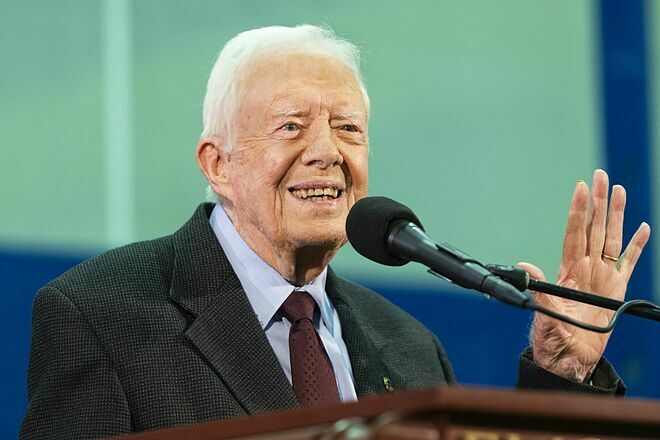
Photo: Jimmy Carter - vnexpress 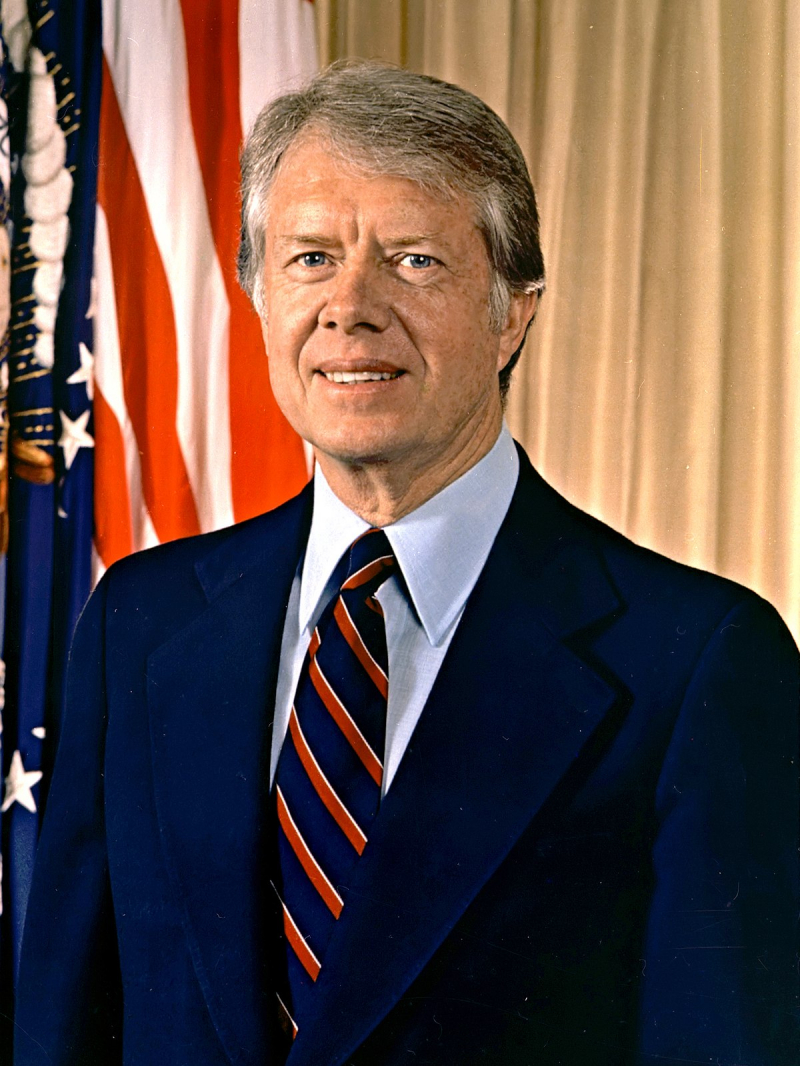
Photo: Jimmy Carter - wikipedia -
One of the interesting facts about Jimmy Carter is he may have seen a UFO. Two years before he was elected governor of Georgia, Carter was getting ready to deliver a speech at a Lions Club gathering one evening in 1969. One of the visitors alerted him to a weird object that was visible around 30 degrees above the horizon to the west of where he was standing at around 7:15 o'clock. The object, according to Carter, was dazzling white and about as bright as the moon. It was claimed to have gotten closer to where he was standing, but stopped just past a group of distant pine trees. The thing is then stated to have changed colors, going from white to blue to red before appearing to move away.
Carter believed that the thing was not solid in nature and was instead self-illuminating. According to Carter's story, it was seen by perhaps ten or twelve other persons and was visible for 10 to twelve minutes before it disappeared from view.
Carter stated in 1973: “There were about twenty of us standing outside a little restaurant, I believe, a high school lunchroom, and a kind of green light appeared in the western sky. This was right after sundown. It got brighter and brighter. And then it eventually disappeared. It didn't have any solid substance to it, it was just a very peculiar-looking light. None of us could understand what it was.”
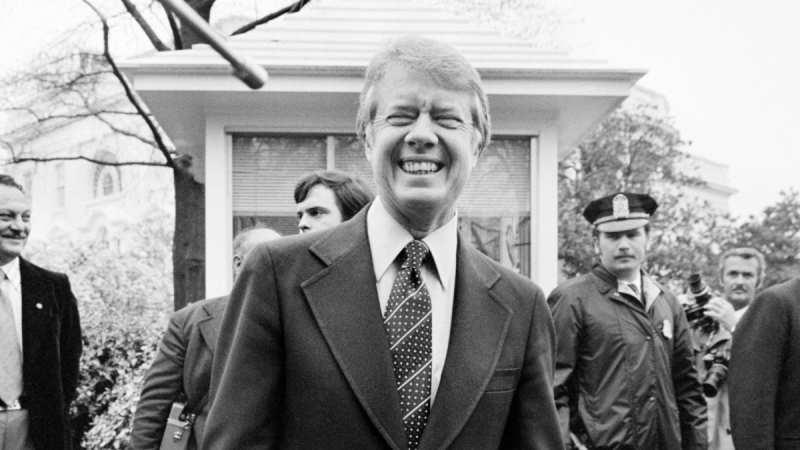
Photo: Jimmy Carter may have seen a UFO - history 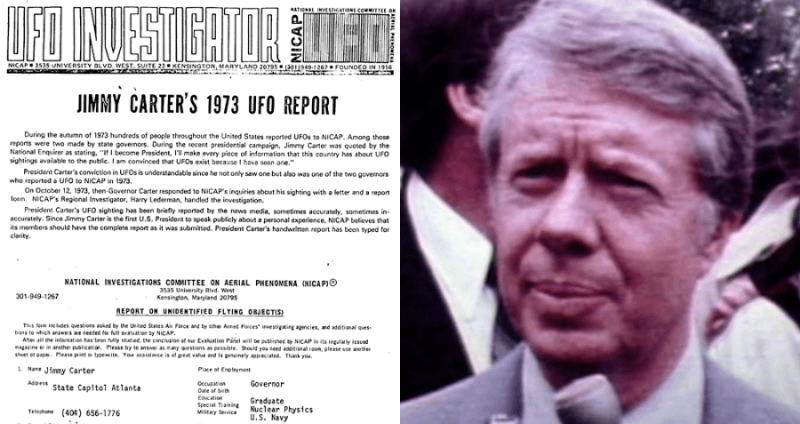
Photo: Jimmy Carter's UFO Sighting - allthatsinteresting -
In a televised speech on April 18, 1977, Carter stated that the energy crisis in the United States in the 1970s was the “moral equivalent of war.” Years before it was widespread, he promoted energy conservation among all Americans and placed solar water heating panels on the White House. To compensate for dialing down the heat at the White House, he wore sweaters.
The Department of Energy was established when Carter signed the Department of Energy Organization Act of 1977 on August 4, creating the first new cabinet position in eleven years. Carter attributed the need for the measure to the “impending crisis of energy shortages” during the signing ceremony. Carter said that the House of Representatives had “adopted almost all” of the energy proposal he had made five months earlier at the beginning of a news conference on September 29, 1977, feeling as though he had not come across well in addressing energy during his prior press session. Carter called the compromise “a turning point in establishing a comprehensive energy program.” On October 13 of the next month, Carter declared that he thought the Senate would be able to approve the energy reform bill and called it “the most significant domestic issue that we will face while I am in office.”
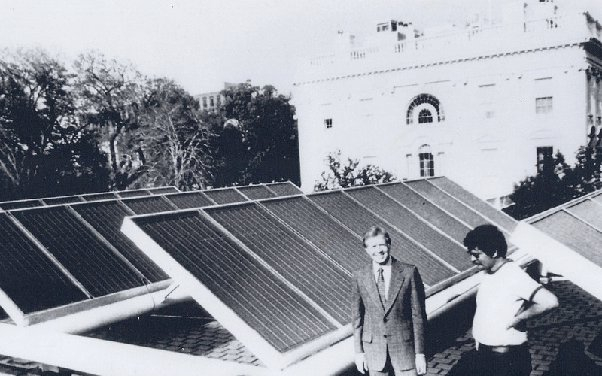
Photo: Jimmy Carter and solar panels at the White House - quora 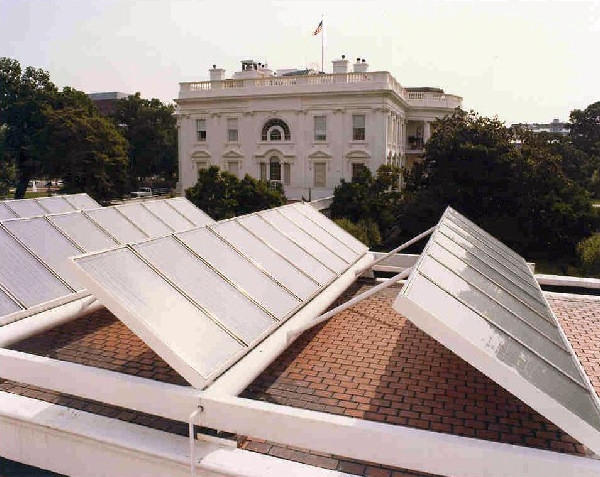
Photo: Solar Panels - solaripedia -
Ronald Reagan, a former actor who served as President of the United States, would likely win the wager if you had to guess which president was the largest movie aficionado. And that would be a wise assumption. According to reports, over his two terms in office, Reagan watched 363 films.
Jimmy Carter, though, was at least one president who outwatched him. One of the interesting facts about Jimmy Carter is even though he was the antithesis of a “Hollywood” president, the former peanut farmer watched more than 400 movies while serving as commander in chief, on average two every week. And only four years, compared to Reagan's eight, were spent in office! There were several screenings that were exclusive to the President and First Lady. Other times, the White House provided guests with a movie to watch that evening. Autumn Sonata, a film by Ingmar Bergman, was screened on April 30, 1979, and about 48 members of the White House staff were there. On February 4, 1978, at Camp David, Carter watched Star Wars with Egyptian President Anwar Sadat. That gathering was actually a covert strategy discussion for Middle East peace that helped set the stage for the momentous Camp David Accords between Egyptian President Anwar Sadat and Israeli Prime Minister Menachem Begin in September 1978.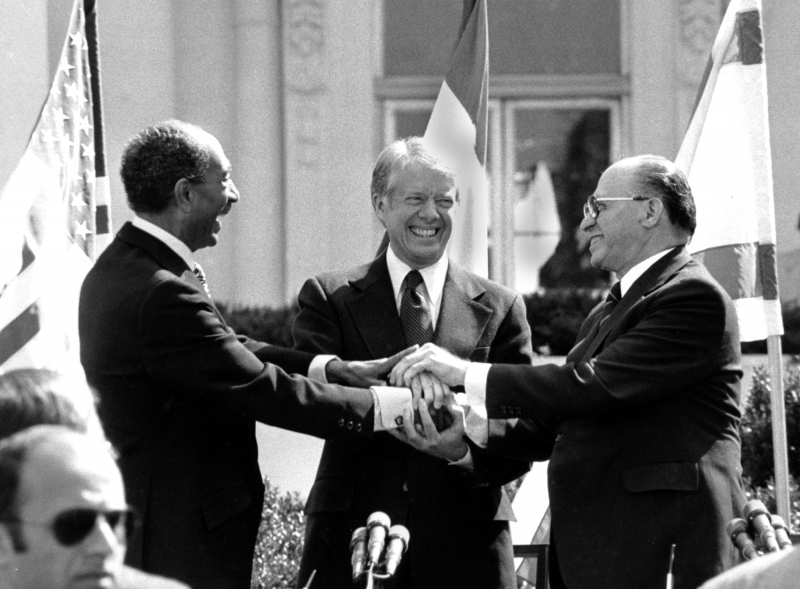
Photo: Remembering Anwar Sadat's legacy - The Boston Globe 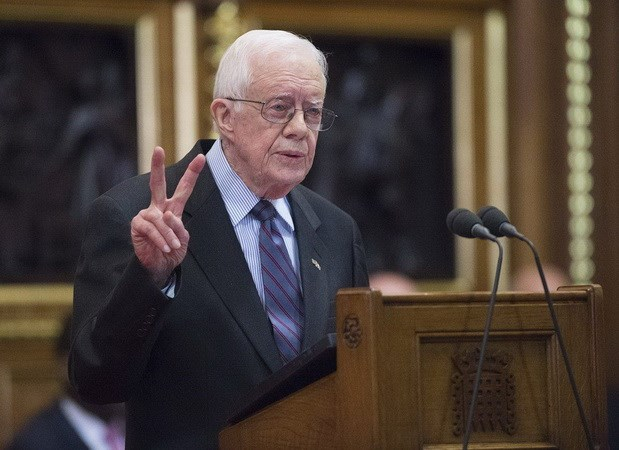
Photo: Jimmy Carter - vietnamplus -
The hostage crisis in Iran in 1979–1981; the energy crisis in 1979; the Three Mile Island nuclear accident; the Nicaraguan Revolution; and the Soviet invasion of Afghanistan signaled the end of his presidency. By ending détente and imposing a food embargo against the Soviet Union in response to the invasion, Carter exacerbated the Cold War. President Jimmy Carter declares on March 21st, 1980, that the United States will abstain from the Moscow Summer Olympics. The announcement was made after Carter gave the Soviet Union until February 20, 1980, to withdraw its forces from Afghanistan. The country had never before failed to participate in the competition. Carter was followed by the likes of Canada, West Germany, Japan, and over 50 more nations. The Soviet Union was the next country to back out of the Games when they were moved to Los Angeles in 1984.
Carter imposed a trade embargo on two items from the United States that the nation sorely needed: grain and information technology, in addition to the boycott, to put more pressure on the Soviets to end their involvement in the war in Afghanistan. In ocean waters that were under American control, he also prohibited Soviet fishing. Carter urged the U.N. to offer military supplies, food, and other aid to Afghanistan's neighbors, particularly Iran and Pakistan, in order to help them fend off further Soviet incursion.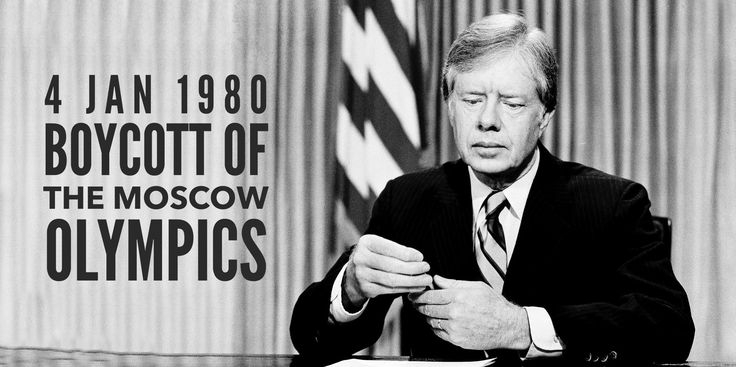
Photo: Jimmy Carter Boycotted the Moscow Olympics - pinterest 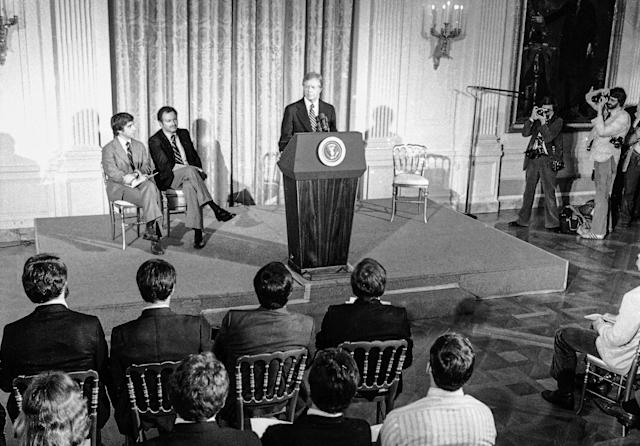
Photo: Ghost Olympians: The 1980 boycott and the American lives it forever changed - sports.yahoo -
Carter chose to take some time off and go fishing close to his home in Plains before running for (and losing) re-election in 1980. A wild rabbit that was being pursued by hounds jumped into the river and swam toward his boat while he was in it. With a paddle, Carter pushed the beast away. Carter's workers did not accept his story when he returned to his office, claiming that rabbits could not swim or that one would never approach a person threateningly. But a White House photographer had captured the incident on camera, and a later administration made the image public.
Even though it was only a minor occurrence, Carter's political and ideological foes used it to portray his presidency as hopeless and weakened, despite the fact that it was only a minor episode. Some people believed Carter was a less-than-ideal foe for the powerful Soviet Union due to a photograph of him wailing at the rabbit and countless editorial cartoons, which may have contributed to the perception of Carter as ineffective.
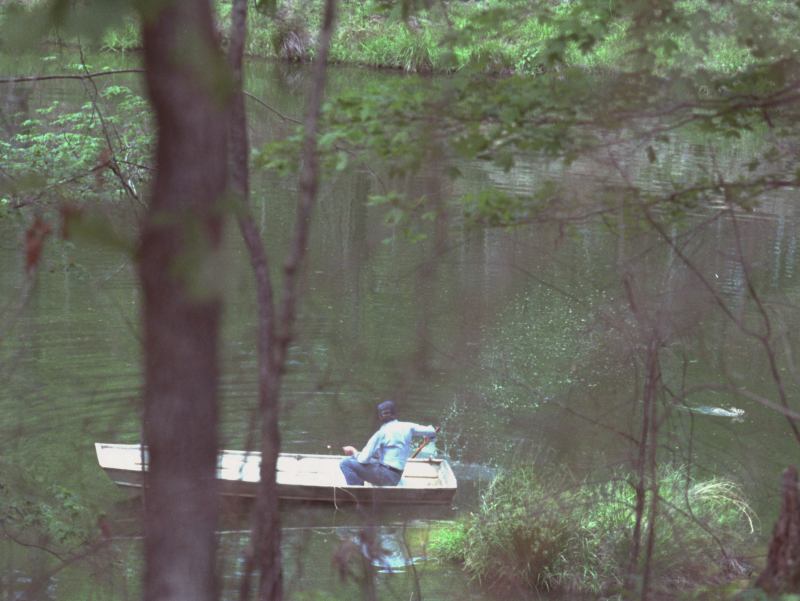
Photo: Jimmy Carter rabbit incident - Wikipedia Source: Wiki4All youtube channel -
Carter moved to Plains, Georgia, to retire. Since that time, Carter has led in both diplomacy and humanitarianism. He actively supports Habitat for Humanity, as does his wife. Additionally, he has engaged in both professional and private diplomatic activities. He worked with North Korea to draft a stabilizing agreement in 1994. For his decades of tireless work to find peaceful resolutions to international crises, advance democracy and human rights, and foster economic and social development, he was given the Nobel Peace Prize in 2002. It was actually overdue, the Nobel Committee had intended to give him the Prize in 1978, after he had assisted in arranging peace talks between Israel and Egypt, but no one had put out a nomination before the official nomination period had ended.
During his presidential campaigns, Carter voiced his adamant opposition to the death penalty, which has made him well known. Carter advocated “prohibition of the death penalty” in his Nobel Prize lecture. He has persisted in speaking out against the death punishment, both domestically and internationally. Carter pushed the governor of New Mexico, Bill Richardson, to approve a bill that would replace the death penalty with life in prison without the possibility of parole.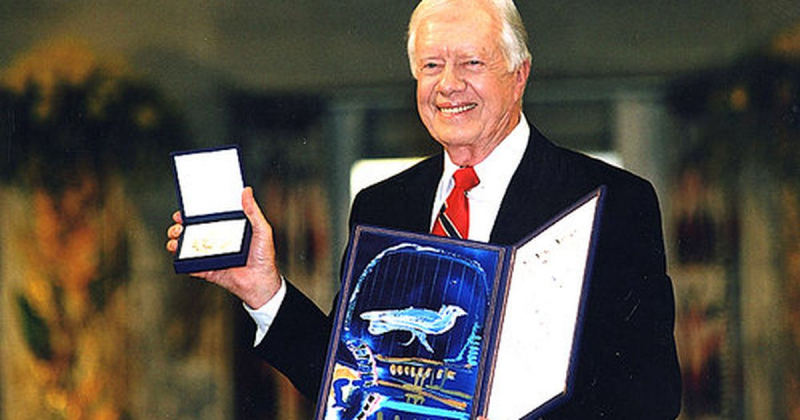
Photo: Jimmy Carter wins Nobel Peace Prize - ajc Source: CNBC International TV youtube channel

























